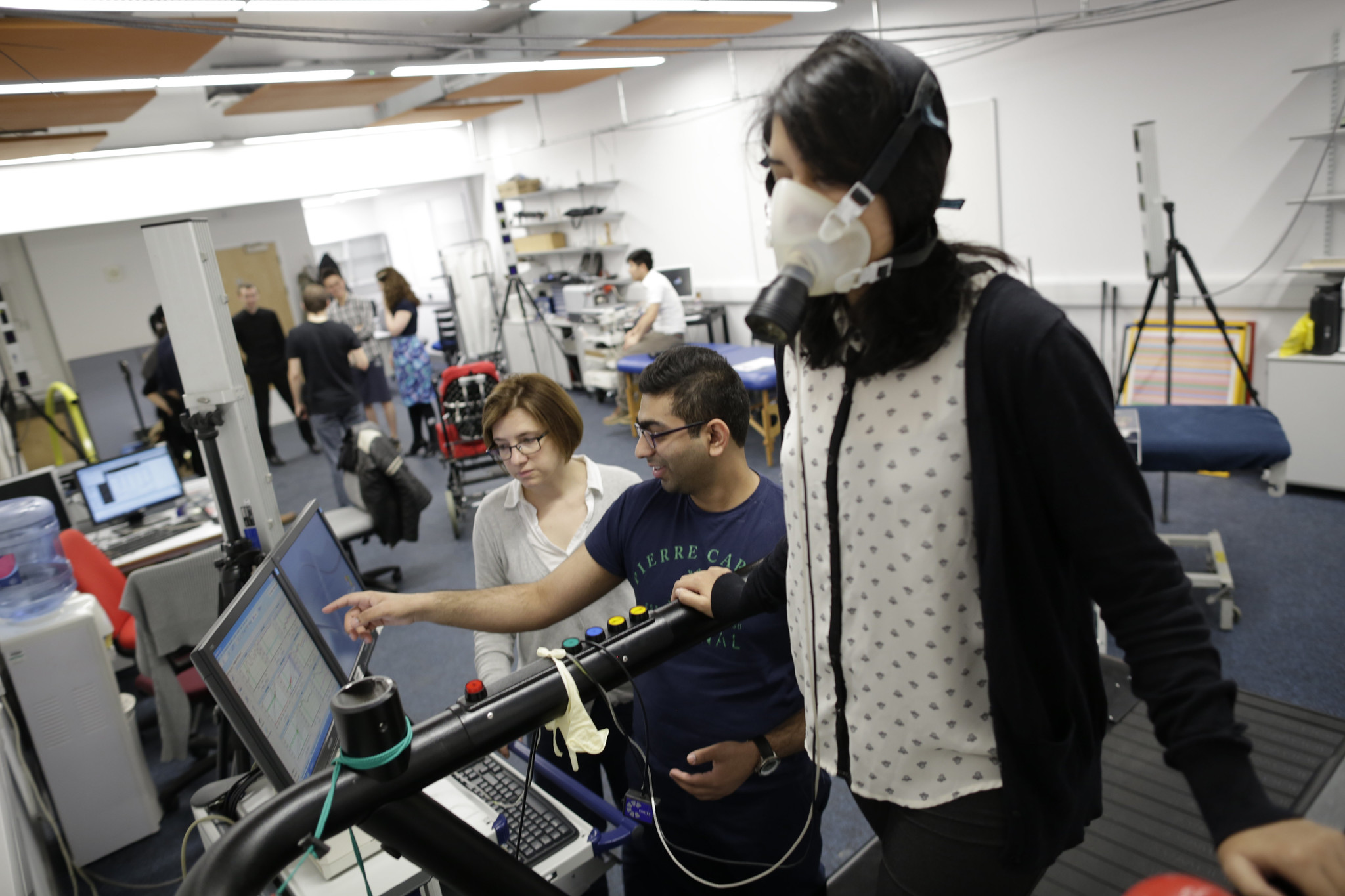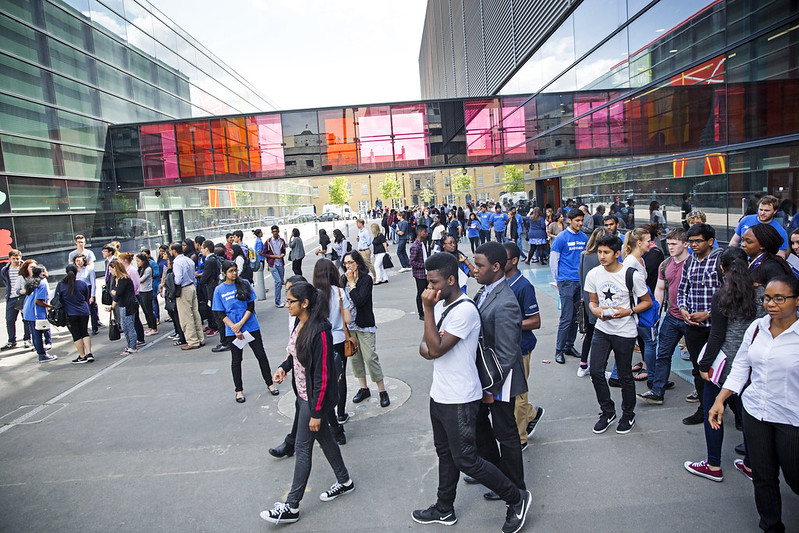Interrupting your studies
If you take time out from your studies, we call this ‘interrupting’ your studies.
 You might want to interrupt during an academic year or between academic years.
You might want to interrupt during an academic year or between academic years.
It's possible to interrupt for a maximum of two years during your course, normally one year at a time. Interruptions for a period longer than this are only granted in highly exceptional circumstances and with the permission of the Queen Mary Academic Registrar. You can find information about this in the Queen Mary Interruption of Study Policy Guidance is available in the Policy Zone under Academic Policy, regulations and procedures.
Students interrupt for all sorts of reasons. Whatever the reason, discussing your circumstances can help you make an informed decision so try and get advice about your options as soon as you can. Getting the right advice and support may help you continue your studies at Queen Mary without the need to interrupt. Your School can provide academic advice and support, the Advice and Counselling Service provides a range of services from wellbeing and emotional support to practical, financial and funding advice, the Disability and Dyslexia Service provides advice about academic arrangements and study support if your health, disability or learning differences are affecting your studies and the Library Teaching and Learning Support Team can provides academic skills support.
If you decide that you want to interrupt your studies, you will need permission from your Academic School and should discuss this with your Personal Tutor or Academic Adviser to determine your interruption date and the best time for you to return. There is a Student Support Officer for most academic schools and they are usually your first point of contact.
If you are an undergraduate or a taught postgraduate student, you can normally only resume at the start of a semester, not part way through a semester. In addition re-joining part way through an academic year may not be allowed for some courses e.g. some medical courses.
You can fin information about how to interrupt on the Registry Services site.
Student funding implications
Your Student Finance England funding will be affected if you interrupt your studies. The following information applies to student's who receive or are applying for Student Finance England funding. The rules differ for other nations so if you receive Student Finance from Student Finance Wales, the Scottish Awards Agency or from Student Finance Northern Ireland , contact them directly to check how your funding will be affected and/or contact a Welfare Adviser if you remain unsure and require advice.
Interrupting can affect your funding entitlement during the academic year in which you interrupt, during the interruption period itself and can also affect the funding available to you when you resume your studies. It can affect all undergraduate and postgraduate loans and any additional grants paid for dependents or disability. So it is very important to be aware of how this works and the options available to you. For information about this visit our Student Funding Implications pages.
Other Funding:
If you are financially sponsored by a government or another official sponsor, you will need to check with them how your funding is affected if you interrupt and if this will remain available when you return to study.
If you receive a Scholarship or stipend from Queen Mary, you must also check with the Research Degrees Office how this will be affected if you interrupt your studies.
Tuition Fees
Interrupting can also affect your tuition fee liability and the amount you are required to pay, both in the year you interrupt and also in the year you return. It depends on the date your school use as your interruption date and the date you are expected to return to your course. You may also end up paying more tuition fees for your course if you are required to re-start or re-take a semester and are required to attend your course as a tuition fee is normally charged for this. Visit our Tuition fee implications page for more information.
Immigration Implications
International students in the UK with student immigration permission (a student visa) are not normally able to remain in the UK during a prolonged period of interruption and the Home Office can curtail (cancel) a student visa. Information about how interrupting can affect your student visa is available on the page visa implications to changes of your programme.
Students who are temporarily enrolled at the start of an academic year
If you are temporarily enrolled at the start of an academic year, you will have a deadline by which you must fully enrol. If you are unable to fully enrol by this deadline and further extensions to your temporary enrolment are not agreed, your studies at Queen Mary will normally end and you with be withdrawn from your course.
If you are a continuing student, are unable to re-enrol and do not want to lose your place on the course, contact the Student Support Officer for your School to discuss whether you can interrupt your studies instead.
If you are starting a new course and have temporarily enrolled but are unable to meet the conditions to fully enrol e.g. pay the required amount of tuition fee or provide evidence of your qualifications by the deadline, you could apply to your academic school to interrupt your studies, rather than have your student record permanently closed. If you are allowed to interrupt, this would allow you to resume your studies at the start of the following academic year, without having to apply for a new course place. Contact the Schools Student Support Officer to discuss this.
You will need to request an interruption and the process to do this is process explained by Registry on their Interrupting your studies page.
Tuition fees are not normally charged to students who do not fully enrol onto their course.
How do I arrange an interruption of study?
An interruption of studies must be requested. Information about how to apply to interrupt is available on the Queen Mary Academic Registry site.
Undergraduate students and postgraduate students can submit a request online through Mysis but Associate students will need to continue to use the existing forms.
For Undergraduate and Postgraduate taught courses that start in September, there are specific interruption deadlines. Most programmes now have two assessment periods, one in January following Semester A teaching and one in May following Semester B teaching. If you do not wish to start the next Semester or sit the exams, the deadline for submission of the interruption form for most programmes is the day before the start of these assessment periods. The Queen Mary academic calendar lists Semester dates and exam periods.
Arrangements can differ for courses that start in January or for courses that are held outside of the UK or are distant learning programmes. Therefore, always check the deadline for submission of the interruption form with your Academic School.
If you are a medical or dental student, the official deadlines for interrupting differ according to which course you are studying and on the academic year. Check with the Student Office at Whitechapel
If you are a PHD student check with the Research Degrees Office.
The date you are allowed to resume depends partly on what point in the year you interrupt. For example, if you sit the Semester A exams in January and interrupt before the assessment period, you will have completed the assessments for Semester A and can therefore normally only resume at the start of semester B the following academic year. Whereas if you interrupt by the deadline before the Semester A exams, you may have the option to either resume your studies the following September and re-take Semester A or, resume the following January to sit your January exams, and continue onto Semester B.
If you are an undergraduate student, you may complete the academic year but decide during the summer vacation that you need to interrupt your studies for the year ahead. You would still need to obtain permission from your Academic School and apply for an interruption, but the normal interruption deadlines do not apply in this situation.
You should discuss and decide your interruption and date of return with your academic school. The Student Support Officer for your School is usually able to help with this although if you are a PHD student contact the Research Degrees Office. Your school will need to approve your interruption of study and agree your proposed return date.
Taught master's students who start their course in September and who want to interrupt after the May exams but before their project period, can interrupt once the exam period is over. The deadline for interrupting in these circumstances is usually towards the end of June. Please check with your School for the deadline relevant to your course.
If you have only narrowly missed the interruption deadline and you have evidence of compelling reasons why you could not meet this, for example if you were in hospital or very unwell, you can talk to your academic school about whether they can exceptionally process a late interruption.
If you miss the deadline but feel that you are unfit to sit your exams or submit coursework due to medical or personal circumstances, you can consider making an Extenuating Circumstances claim. This may involve getting documentation to give to your school as evidence to support your claim. Student Experience provide a Guide to Extenuating Circumstances.
Student Funding
If you receive student funding, interrupting studies can affect your entitlement to receive this funding for the remainder of the year in which you interrupt study, during your interruption period and may also affect your entitlement in the year you resume studies. You will need to consider how you will financially support yourself during this time.
Date of interruption and impact on student funding: If the School decides your last date of attendance is some time ago and your interruption is backdated, this can affect your student funding entitlement. For example, Undergraduate students may have been paid too much Maintenance Loan and SFE will ask for this to be repaid.
For information about this and the options available visit our Student Funding Implications pages.
Tuition Fees
Interrupting studies during an academic year can also affect your tuition fee liability in the year of interruption and the year you resume your course. It depends on the date your school use as your interruption date and the date you return to your course. You may be required to pay tuition fees for a re-take period of study in attendance or if you have to restart a Semester.
Have a look at the information about Tuition Fee implications for Undergraduate and postgraduate students .
International students
If you are an international student in the UK and hold Student immigration permission (Student visa), this permission will be affected if you interrupt your studies. It's very important you are aware of the implications before you make a decision. We have information about this in Visa implications to changes of your programme
Will I need to do anything before I return from an interruption?
Ask your school well in advance of your resumption of study date if they will need you to provide any information before they can allow you to resume. For example, if you interrupted for health reasons, the school might need you to provide medical evidence that you are now well enough to study.
If you interrupted due to ongoing ill health, disability, specific learning difference, or mental health condition, contact the Queen Mary Disability and Dyslexia Service several weeks before you are due to resume. They can advise you about any extra support you may be eligible for, and if you have contacted them early enough, put this in place in time for your resumption.
Undergraduate Home Students
If you are an Undergraduate student and receive UK government student funding, you will need remember to re-apply for your Student Finance for the next year of your course - it is advisable to do this several months before you resume. This will allow time to sort out any issues that arise before you re-join your course and allow time for you to consider your options. For example:
- If you have retaken a year before or you have previous study on an earlier degree level course and you now have to retake a year in attendance, a Tuition Fee Loan may not be available to you to pay your tuition fee when you resume your studies Visit our Student Funding Implications page for information about this and about how to request an additional year of Tuition Fee Loan based on compelling personal circumstances.
- If interrupting means you have received too much Maintenance Loan for the academic year, this will be classed as an overpayment. Student Finance England will usually recover this by reducing the amount of Maintenance Loan available to you for the following year, when you resume study. If this will cause you financial hardship you can ask SFE to defer recovery of the overpayment to the following year. If SFE do not approve this or you do not apply to be considered you will have to plan your budget for the year ahead using your reduced Maintenance Loan entitlement. We have more information about what happens if you are overpaid on our Student Funding Implications page.
If you are resuming studies in January and encounter problems when applying, contact a Welfare Adviser for advice and also read the information and options in the Undergraduate Student Funding implications guidance.
International Students
If you require immigration permission to return to the UK to complete your course, make sure you allow sufficient time to apply for and obtain your new immigration permission. You can find information about immigration and interrupting on the Changes to Studies page and we have helpful guidance to support you to make a student visa application.
Other factors to consider
As explained, interruption can affect your funding, tuition fee liability and student immigration permission (if applicable) and you may have to consider how you will financially support yourself while you take time out of your studies.
Here are some other factors to consider. You also read our information about other practicalities to take into account while you are no longer attending a course at Queen Mary.
Your School Student Support Officer can advise if there are any course related issues, for example will the module options or course structure remain the same when you return to your course. Research degree students should read the Research Degrees Office information.
EU Settlement Scheme
If you intend to spend time outside of the UK while you interrupt and you hold EU Pre-Settled status check how absences from the UK can affect this status and future eligibility for EU Settlement in our information about the EU Settlement Scheme.
State Welfare Benefits
International students in the UK with Student Immigration permission or visitor permission must not claim any welfare benefit as it is a breach of their immigration conditions. Students in the UK with any other type of immigration permission should always seek advice before making any claim.
The Welfare Benefit Social Security regulations prevent most full-time students claiming any welfare benefits throughout their studies including during any period of interruption. However, the benefit rules do permit certain students to claim:
Students with dependent children are eligible to claim. For information, visit our page for students with children.
Students with personal care or mobility needs may be eligible for for Personal Independence Payment if they meet the eligibility requirements. We have more information about claiming this on our Extra money: disability or ill health section.
Students with a disability or ill health who already receive Personal Independence Payment (PIP) and who receive other benefits such as Universal Credit immediately before starting a course may be able to continue these claims during their course, including while they interrupt. However full-time students who do not already receive Universal Credit are not normally able to make a new claim for this benefit during their course, because the current Universal Credit rules prevent a new claim being approved. This includes during a period of interruption as students remain registered on their course during this time. For information, visit our Extra Money: disability and ill health section. You can also contact a Welfare Adviser to discuss your circumstances.
However, there is an exception. If you have interrupted due to ill health or because of caring responsibilities and do not receive your student loan while interrupting, you may be entitled to claim Universal Credit once you are no longer unwell or once your caring responsibilities have ended. You can claim until the date you resume your course, or for up to one year, whichever is sooner. You must be available for and actively seeking work and be able to meet the commitments of your Job seeking agreement. You do not need to be in receipt of PIP to claim in these circumstances.
There are no specific benefit rules that exclude students registered on a part-time course from claiming welfare benefits during their course, including during an interruption period, although students must meet the general eligibility rules for each Welfare Benefit. At Queen Mary there are no part-time undergraduate courses, only part time postgraduate courses.
Please note that student loans and other study loans count as income for welfare benefits and this income will reduce the amount of benefit payable. This income should always be declared to avoid overpayments being made. This counts as income if you are eligible for the funding, even if you choose not to take it out.
You may want to contact a Welfare Adviser to discuss your circumstances.
Working
You may need to work to support yourself during a period of interruption. Our Working during your Studies page has information about this.
International students in the UK with Student Immigration Permission are not able to remain in the UK to work while they interrupt as interrupting normally means your visa will be curtailed. You can find further information about this in the Immigration section below and also in our Visa and Fee implications and changes to your study information.



